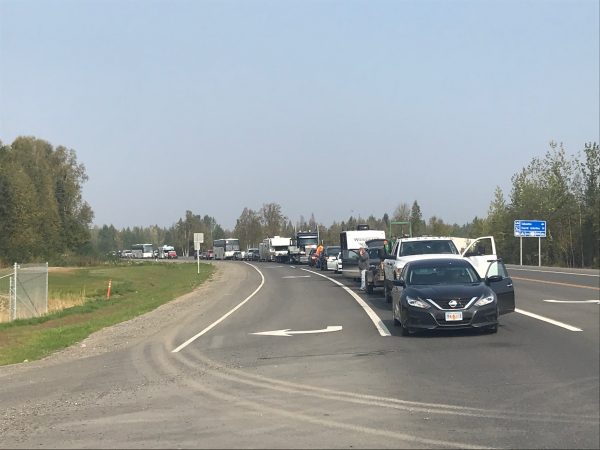
Major wildfires that flared up in Southcentral Alaska over the weekend paralyzed some of the region’s busiest road corridors, forcing re-routes and long waits for travelers, buses filled with tourists and trucks trying to re-supply grocery stores from Soldotna to Fairbanks.
Both the Parks and Sterling highways — major transportation routes north and south of Anchorage — experienced temporary closures due to the fires. As of Tuesday afternoon, the highways were passable but with major delays, according to the Alaska Department of Transportation.
Officials warn they may close again with little notice.
“There’s a lot of very erratic fire behavior and so it tends to change very rapidly,” warned the transportation department’s Meadow Bailey.
Bailey said the state is advising travelers to avoid driving through fire areas unless it’s absolutely necessary.
“The traffic is really, really heavy, there are a lot of long wait times and additional travelers just make that situation even more difficult,” said Bailey.
Traffic backups are a hot topic on a Facebook group set up for locals to post information about the McKinley Fire along the Parks Highway.
Colleen Bridge, who lives in both Talkeetna and Anchorage, posted photos of the line of traffic near the Talkeetna Spur Junction on Monday afternoon. In a Facebook message, Bridge said she ultimately waited two hours to get through, on her way to doctor and dental appointments in Anchorage.
Driving through, Bridge reported seeing “obvious burn areas” and “smoldering visible” but “no open flames.”
For one major trucking company, the wildfires have resulted in significant delivery delays to both the Kenai Peninsula and Fairbanks, forcing truckers traveling north to take an alternate route, according to Paul Friese, vice president of sales and marketing for Lynden Transport in Alaska.
Friese said staffing is the biggest challenge. The Alaska Railroad is restricting freight service to Fairbanks due to both the McKinley Fire and a retaining wall failure near Healy, so Lynden has been scrambling to find enough drivers to compensate.
“We’re kind of juggling to figure out what’s next, and surviving and getting through it, but it’s been certainly a challenge,” said Friese.
Getting chilled and frozen goods to grocery stores on the Kenai also has been an issue, said Friese.
“We were able to get some vehicles down there and then they closed the road en route, so we had drivers that have sat for I think 10 or 12 hours on the highway waiting to get through,” said Friese.
Fred Meyer director of corporate affairs Jeffery Temple said the road closures on the Sterling Highway have made it difficult to restock the store’s Soldotna location. But that store should be re-supplied today, he said.
“We do have five trucks that are ready to go,” Temple said.
The wildfires have also caused a logistical mess for Southcentral Alaska tourism companies.
Josh Howes is president of Premier Alaska Tours, which runs a fleet of over 100 motor coaches. Howes said at about 5 p.m. Sunday, their company had about 1000 tourists in buses stuck at the Talkeetna Spur Junction trying to get through the fire.
“Most of them had flights out on Monday to fly home or they had to get to a cruise ship on Monday,” said Howes.
“We waited and waited, hoping that there would be an opening at some point, and at 11 o’clock at night, we finally had to turn everybody around and go back to Denali or Fairbanks,” where they had to find hotel accommodations for them all during peak summer tourist season, Howes said.
“It was pretty significant, for sure,” said Howes.
The Kenai Peninsula fires led some travelers to abandon plans to take the Sterling Highway and seek alternate modes of transportation, and some charter plane companies reported an uptick in demand.
Tom Soderholm, director of operators for Smokey Bay Air in Homer, said they received around 10 charter requests over the weekend until the road re-opened, mostly from tourists.
“It was just basically helping people out of a jam that needed to get to some of the places that the road closure would not allow,” Soderholm said.
Smokey Bay Air also offers bear-viewing tours, and the road closures affected that business, as well, Soderholm said.
“We’ve had to do a lot of rescheduling,” he said.
This post has been updated. Reporter Nat Herz contributed.
Elizabeth Harball is a reporter with Alaska's Energy Desk, covering Alaska’s oil and gas industry and environmental policy. She is a contributor to the Energy Desk’s Midnight Oil podcast series. Before moving to Alaska in 2016, Harball worked at E&E News in Washington, D.C., where she covered federal and state climate change policy. Originally from Kalispell, Montana, Harball is a graduate of Columbia University Graduate School of Journalism.




